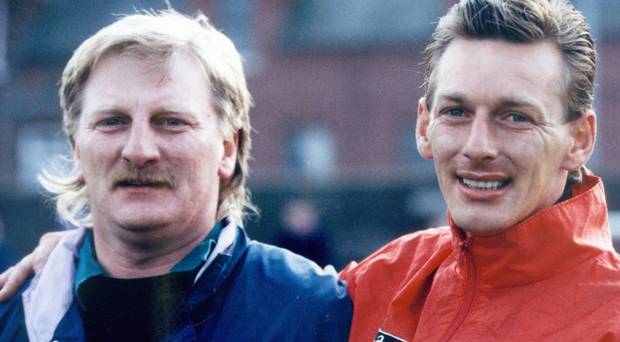

By Graham Luney
January 18 2019
In the latest of our popular Footballers’ Lives series, Crusaders legend Roy McDonald discusses personal tragedy, playing against Liverpool greats, his faith, and having the Football Centre at Seaview named after him.
Q How did your football career start?
A I was at Rathcoole Youth Club and also playing in the Churches League when I was 15. It was a man’s set-up and a steep learning curve for me. I’ve fond memories about reading the scores in the Ireland’s Saturday Night newspaper.
I was a schoolboy international and Jimmy Nicholl was a neighbour of mine, a bit younger than me. Distillery scout Norman Brady watched our games and brought me to the club. I was still a boy playing against men.
During my newspaper deliveries, the Crusaders secretary Harry McClelland invited me down to the club to train with them. In those days there was no goalkeeping coaching, you relied on your talent. When I did join the Crues it was in 1972.
Q You had a trial at Birmingham City. How did that go?
A I went there with Derek Spence, an Irish international who signed for Bury and Oldham. Freddie Goodwin was the manager but he was sacked while we were on trial.
They signed a goalkeeper, Mike Kelly, from Queens Park Rangers, and he ended up becoming goalkeeping coach for the FA. I was disappointed to come home but had little time to think about it.
Jimmy McAlinden was Distillery manager and he picked me up from the airport. I got changed in the back seat of his car and played in a Youth Cup semi-final against Coleraine at Solitude.
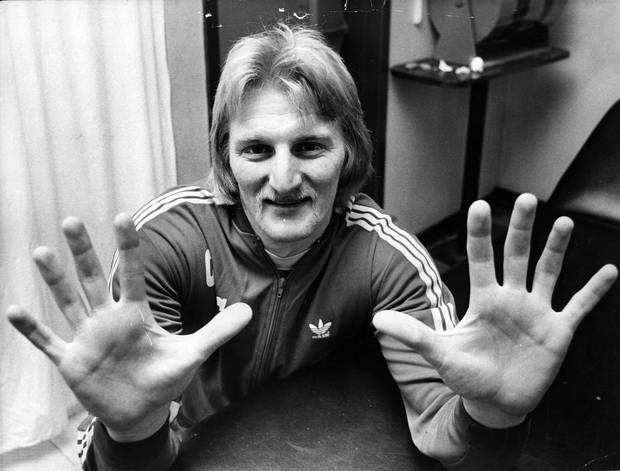
Q You played with former Northern Ireland captain Martin O’Neill at Distillery. What was he like?
A Martin hadn’t a clue about football! He was a Gaelic player and I used to pick him up at Kansas Avenue and bring him to training and drop him back again.
It didn’t take him long to learn the game, he was quick and strong, a very skilful player. He was a St Malachy’s lad who was going to be a solicitor. I knew he was always a big talent. People flocked to watch him. He could really hit a powerful shot and scored some great goals.
Q Was the Irish Cup win with Distillery in 1971 a special time?
A It was fantastic but it was a poor crowd. The Troubles had just started in 1970 and neither Derry City nor ourselves would bring a big support. We lost a lot of our support to Cliftonville when Grosvenor Park disappeared.
The other beauty about winning the Cup was drawing Barcelona in Europe. They beat us 3-1 at Windsor Park with Martin (O’Neill) scoring the goal. We went to the Nou Camp and stayed a week in Spain.
They beat us 4-0 and I can remember Pepe Reina’s father, Miguel, was in goals and they had a big Spain striker Carles Rexach who went on to become President of Barcelona. The crowd was about 60,000 and the kick-off was about 9pm when we were ready for our beds. Clubs now are much better prepared.
Q Another stand-out memory must be the European clashes for Crusaders against Liverpool.
A That was the season they won the European Cup for the first time in 1977. We ended up playing the first leg at Anfield and we lost 2-0. John Toshack scored their second, I got my fingertips on it and I didn’t know Drew Cooke was standing behind me on the line and perhaps he could have headed the ball away.
I got man of the match and we got a standing ovation from the fans. Billy Johnston was the manager and he brought Billy Bingham and Bryan Hamilton in the night before the game to offer some advice. Billy’s parting words were, ‘This is a brilliant Liverpool team, if they can beat you 11-0 they will do it, don’t be thinking they will take it easy’.
We were determined not to get hammered and in the newspapers it was all about Liverpool playing against a team of insurance agents, shipyard workers and blacksmiths. We were the only team that season to hold Liverpool to two goals at Anfield, they were hammering teams and I can remember Emlyn Hughes being so disgusted with his team’s performance that he didn’t want to come out and chat to us afterwards.
He was the captain who felt his team should hang their heads in shame. That team was packed full of internationals from Ray Clemence to Phil Neal, Tommy Smith, Hughes with Toshack and Kevin Keegan up front. We hit the post and crossbar before they scored at Seaview.
There was 15,000 at it and they closed the gates two hours before kick-off. Supporters sat on the wall and watched from further away as Liverpool won 5-0, scoring four goals in the last 10 minutes.
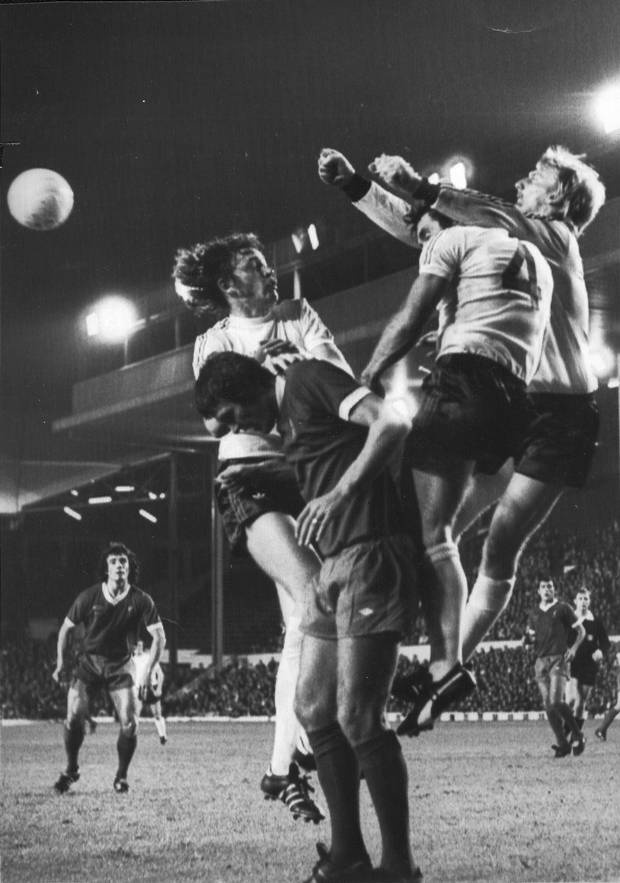
Q How does the Irish League today compare to the game of the 1970s?
A In those days the pitches were chronic. The changing facilities have improved and while we always had good, technical players they never had the fitness levels of today’s players.
They are like athletes now and in the older days you could hardly get the ball off the ground because of the boots you were wearing, especially on a wet day. They are different eras and you can’t compare them. The players now are fit as fleas and can run all day.
Q Was coaching a long-term goal of yours?
A I did my badges when I was playing. There were schoolteachers involved in the coaching side of things and I felt there should be more footballers giving something back.
People walked away from the game but my mindset was that I wanted to give something back and I eventually specialised in goalkeeping coaching.
Q You’ve lost three brothers, Ian, Alan and Jim. How do you reflect on those losses?
A Ian died aged 19 with a brain haemorrhage in 1986 and there’s now a supporters’ club named after him, the Ian McDonald Supporters’ Club. Our former chairman Stephen Bell was one of the founding members of the club. I was the oldest brother, 11 years older than Alan and 15 older than Ian. I can remember the day Ian died.
Tommy Jackson had been sacked as Crusaders manager and I had to take the first team to Coleraine to play a game. It was an unbelievable time and it was a blur but who else was going to be caretaker manager?
Ian’s death was a huge shock. I was on the sidelines at Portadown when a phone call came through and I was asked to come home as quickly as possible as Ian had collapsed and was taken to Whiteabbey Hospital.
My brother Jim said he had been transferred to the Royal Victoria Hospital and he was awake in a bed. Alan came over from England and he returned for a game against Leicester City while Ian was stable. But by the Saturday morning we knew he hadn’t much time left and QPR pulled Alan out of the game and sent him home while I went to Coleraine.
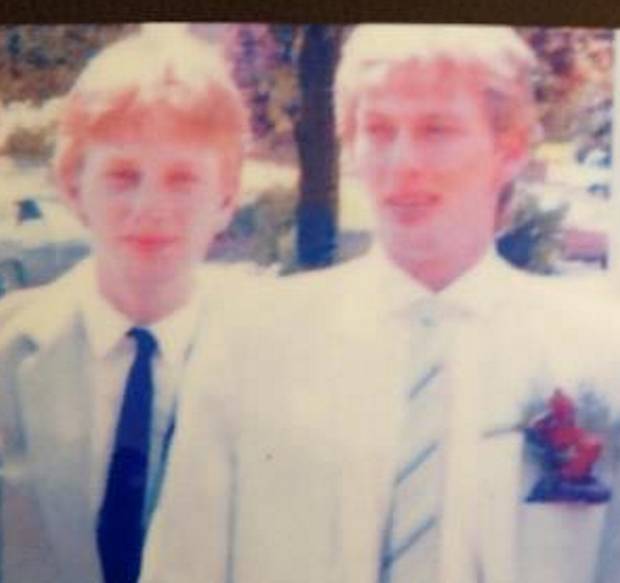
It was all very sad and now Alan is six years dead. My wife Heather and I were driving to Newcastle when I got a call from Alan’s wife saying, ‘Roy, Alan hasn’t made it’. I said, ‘What do you mean, is he dead?’ Again, everything became a blur.
He collapsed on Temple golf course and was taken to hospital. When I arrived a big Glentoran supporter at reception said to me, ‘Roy, I’m awfully sorry. I don’t know what to say, I’m so sorry’. Alan was lying in a room, still in his golfing gear with resuscitation equipment on his mouth.
It was a horrible day and the sad thing about it was that it was preventable. Ian’s death was different as he collapsed in the bathroom and there was nothing we could have done. Billy Beggs, who was Alan’s friend at QPR, passed away and Alan was organising the funeral with the help of the PFA.
A bit earlier Alan was going through emotional torture while Glentoran manager. Supporters were on his back and his health wasn’t good. Doctors had warned him about his blood pressure and more tests could have found the blocked arteries in his heart.
That’s why I feel his death was preventable. My mum Pat and dad Bobby have passed away as well. My dad was kitman at Crusaders. My other brother Jim, a former Irish international basketball player, had health issues before he passed away last October.
I’ve a sister Linda who played hockey. My wife Heather and I have been married for 23 years. I’ve three children, Julie, Dawn and Shelley, while Heather is mother to Graham and Neale.
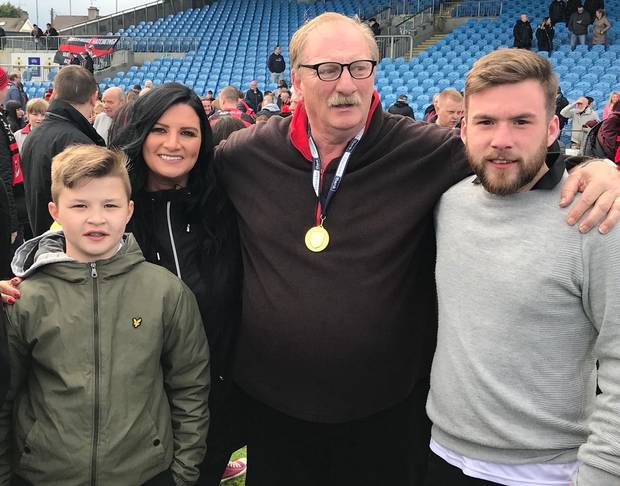
Q It must have been comforting for the family to know how much affection there was for Alan.
A Big time. QPR even named a plane after him. It was great to see Pat Jennings and Ian Stewart offer their support. The late Ray Wilkins was among the many people within football who called me to offer his condolences and his AC Milan jersey raised a lot of money.
Heather has been a huge support too. I met Heather at Whitewell Church and became a Christian in 1995. I’ve needed my faith and the support from my church has been amazing. I know things can test your faith but here I am, still going strong. Crusaders and their fans have been there for me. After Alan’s funeral we were playing a friendly that night and I wanted to go. I walked across the pitch and the whole stand stood and applauded me. The Alan McDonald Trust charity is now administered by the Mary Peters Trust which is great.
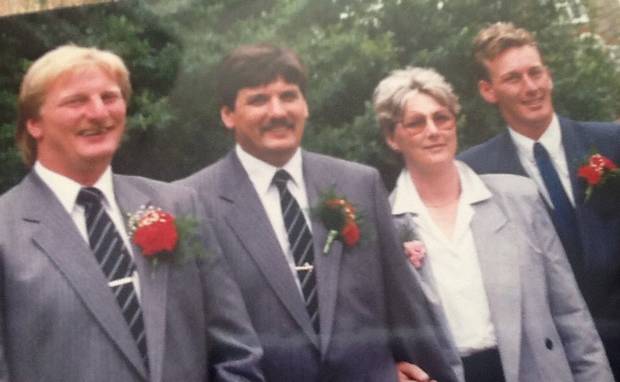
Q Why did you call time on your remarkable Irish League career at the end of last season?
A I’ve more than done my time. I’m 66 now and should have finished a year earlier but it was certainly fitting I could leave after winning the league.
My knees have been troubling me and I will be honest with myself and the club. I’ve done nearly 50 years and my body has taken some pounding. Relegation was the making of Crusaders and hopefully we can do what we have failed to do in the past by building on our success.
Crusaders have won the league seven times since 1973 and I’ve been involved in all seven of them. I’ve worked with 11 managers at Seaview and I wish Stephen (Baxter) and his players all the best in the future.
When I joined the Crues from Distillery the club paid between £300 and £500 to get me and I could have joined Linfield but I had made my decision. The rest is history.
Q Crusaders have just opened the ‘Roy McDonald Football Centre’ at Seaview. How does that make you feel?
A Very honoured and humbled. From the playing side of things I have been there longer than anyone and it’s a great honour. I was joking with them to get the signage right because I didn’t want the kids thinking it was a McDonald’s!
The whole profile of the club has changed and it’s now a lovely ground. I’m proud to say I’ve played a small part in the club’s success and Crusaders will always be in my heart.
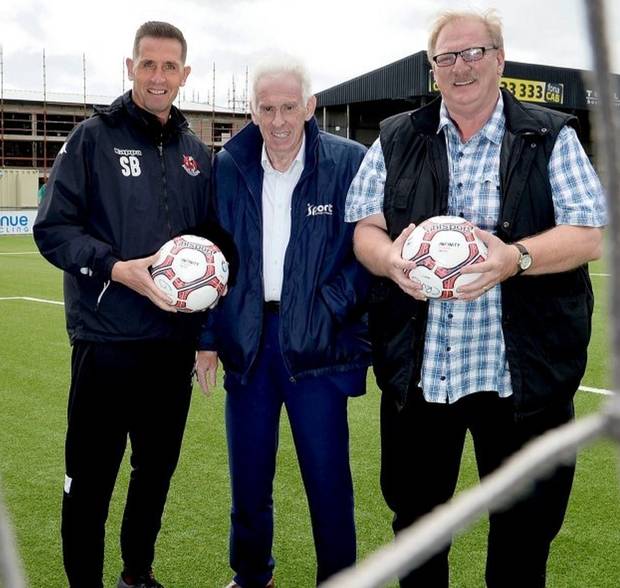
Snapshot
Date of birth: February 10, 1952
Place of birth: Belfast
Previous clubs: Distillery, Crusaders
Crusaders record: 450 appearances
Belfast Telegraph
Parliamentary reports show first speaker only - follow this lnk for the full transcription.
Articles may come from parliamentary reports, various public news feeds and Google News Search. Content is republished here for context. Copyright is respected and remains with the original author at all times. Original Article:https://www.belfasttelegraph.co.uk/sport/football/irish-league/crusaders/footballers-lives-with-roy-mcdonald-ive-lost-three-brothers-but-the-saddest-thing-is-that-alans-death-was-preventable-37723267.html


